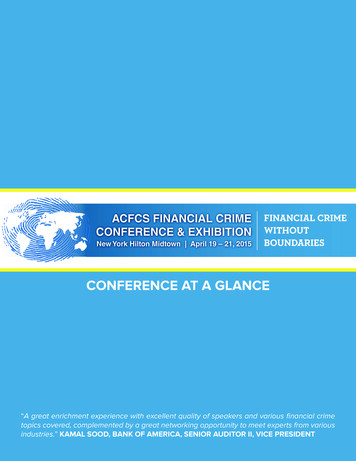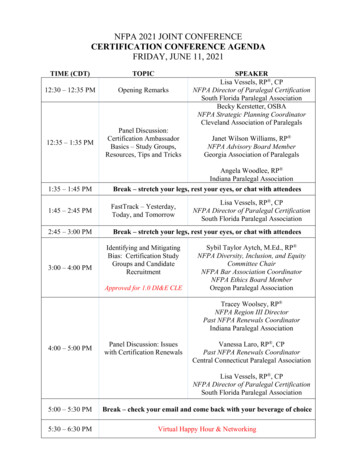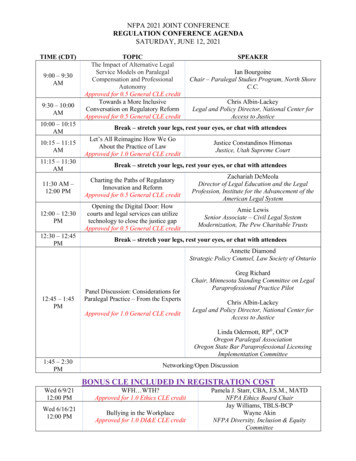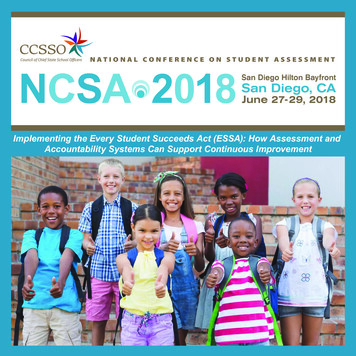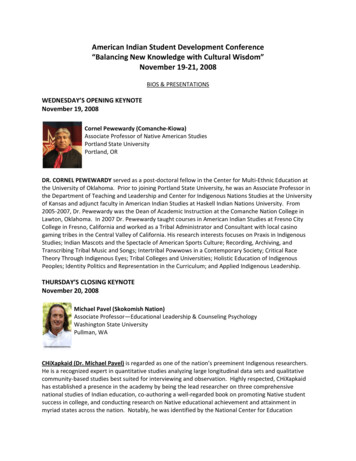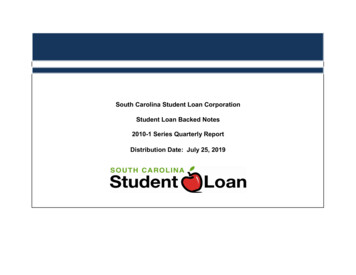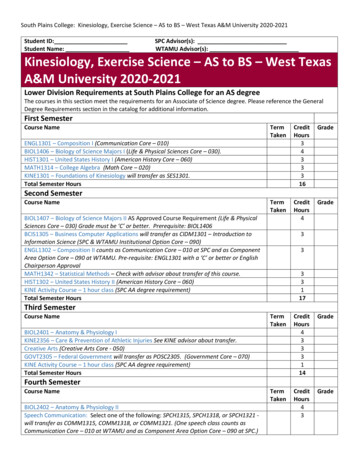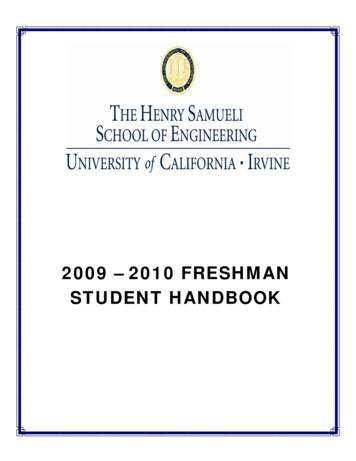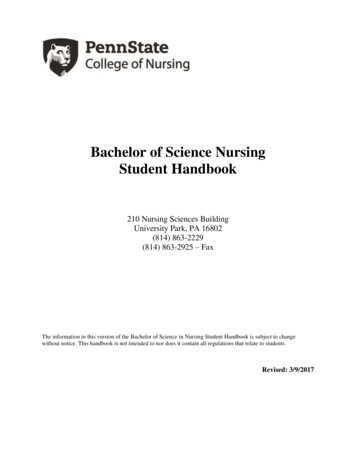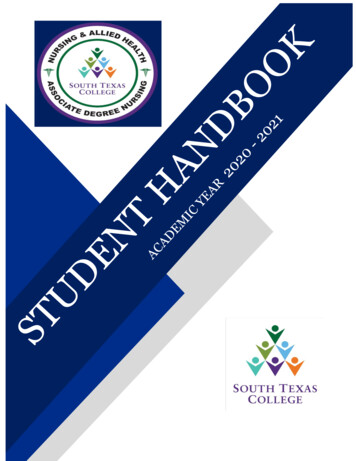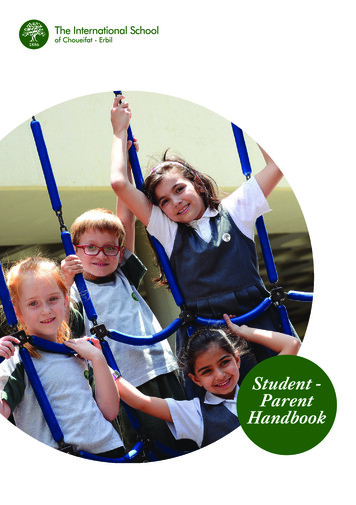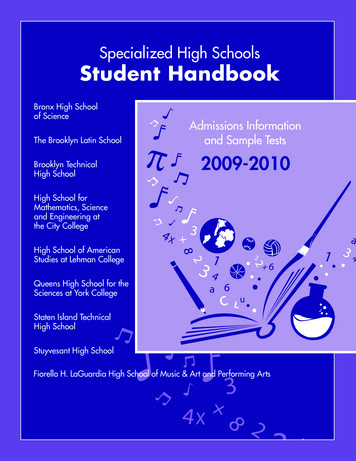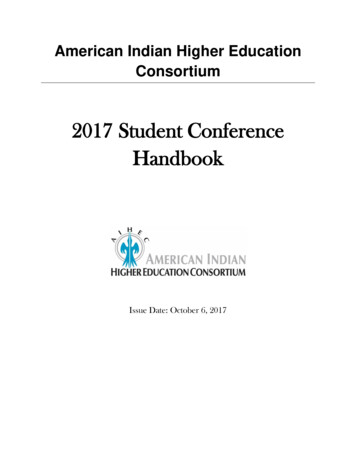
Transcription
American Indian Higher EducationConsortium2017 Student ConferenceHandbookIssue Date: October 6, 2017
AIHEC Student Conference HandbookTable of ContentsPolicyEffective Date:Revision Date:PageINTRODUCTIONTitle PageIntroductory StatementHost Committee RegionsStudent 5/201411PART ONE INTRODUCTION:LOGISTICS & REGISTRATIONHost CommitteePlanning TimelineRegistrationFiscal ManagementFundraising, Advertising, andExhibit BoothsConference VenueConference Theme & LogoLogo Competition FormHotel BlockMeals & RefreshmentsMeeting & Competition SpaceAgenda & SchedulingConference ProgramWebsite & Social MediaWorkshop/PresentationRegistrationKeynote SpeakersOpening Session: Parade ofFlagsStudent ActivitiesPow-WowAwards 6/2016; 10/6/201710/18/201510/18/2015; 223242526272829303132333435
AIHEC Student Conference HandbookPolicyEffective Date:Final Student Awards FormStudent AwardsPre & Post SessionsRevision 2015Objectives and RulesRegistration FormScorecardCompetition GuidelinesART EXHIBITObjectives and RulesRegistration FormJudging FormCompetition GuidelinesBUSINESS BOWLObjectives and RulesRegistration FormCompetition GuidelinesCHESSObjectives and RulesRegistration FormCompetition GuidelinesCRITICAL INQUIRYObjectives and RulesRegistration FormJudging Form36373839PART TWO 014310/6/2017575960
AIHEC Student Conference HandbookPolicyCompetition GuidelinesEffective /201410/15/201462646510/18/201510/18/2015; 10/6/201710/15/201410/15/201410/6/2016; 10/6/1710/15/201410/6/2016; 15/201410/15/201410/6/201677787980OptionalONE-ACT PLAYObjectives and RulesRegistration FormJudging FormCompetition Guidelines10/6/2016RequiredMR. AND MS. AIHECObjectives and RulesRegistration FormJudging FormCompetition Guidelines6110/15/2014KNOWLEDGE BOWLObjectives and RulesRegistration FormCompetition Guidelines10/6/2017RequiredHAND GAMESObjectives and RulesRegistration FormCompetition GuidelinesPageRequiredFILM FESTIVALObjectives and RulesRegistration FormCompetition GuidelinesRevision /2014410/18/201581838485
AIHEC Student Conference HandbookPolicyEffective Date:Objectives and RulesRegistration FormJudging FormCompetition Guidelines10/15/2014SCIENCE 201410/15/201410/15/2014RequiredSPEECHESObjectives and RulesOral Interpretation: Serious,Humorous, or DuoDuo InterpretationPersuasive Speech10/18/201510/15/2014SCIENTIFIC POSTERPRESENTATIONObjectives and RulesRegistration FormJudging FormCompetition Guidelines8687888910/15/2014SCIENTIFIC ORALPRESENTATIONObjectives and RulesRegistration FormJudging FormCompetition GuidelinesPageOptionalPOETRY SLAMObjectives and RulesRegistration FormCompetition GuidelinesRevision 8/2015105106107108
AIHEC Student Conference HandbookPolicyInformative SpeechRegistration FormInterpretation Judging FormInformative Judging FormPersuasive Judging FormDuo Interpretation Judging FormCompetition GuidelinesEffective /201410/15/201410/15/2014TRADITIONAL PLANTSAND HERBSObjectives and RulesRegistration FormCoordinator /15/201410/6/2016; 10/6/17119120121RequiredWEB PAGE DESIGNObjectives and RulesRegistration FormJudging FormCoordinator es and RulesRegistration FormCompetition GuidelinesRevision 3124125APPENDIX A2015 Lead Coordinator Report126APPENDIX B2016 Lead Coordinator Report1426
AIHEC Student Conference HandbookIntroductory StatementSince the first AIHEC Student Conference in 1980, this annual event has grown from a fewdozen participants to over 1,000 students, faculty, and staff coming together each spring tocompete in academic, cultural, and artistic exercises; share stories, and best practices; participatein workshops and plenary sessions; and celebrate the Tribal College Movement. As participationhas grown, the conference has also grown in complexity and organization. In 2010, the AIHECBoard of Directors, composed of the nation’s Tribal College and University (TCU) presidents,requested that AIHEC and TCU staff begin the process of formalizing and standardizing theconference, including competition rules, participation requirements, judging, cost, etc. In 2013,the Board established the AIHEC Student Conference Commission to oversee this process.This handbook, the AIHEC 2017 Student Conference Handbook, is the result of theCommission’s continuing work. We are grateful to the first Student Conference Commissioners,Samantha Cameron, Jonnie Clifford, Carmen Henan, Koreen Ressler, and Carmen Taylor fortheir time, commitment, and willingness to serve and share their knowledge with futuregenerations of Tribal College students, faculty, and staff.The AIHEC Student Conference Commission drafted the AIHEC Student Conference Handbookto acquaint member TCUs with the information needed to host the annual AIHEC StudentConference, typically scheduled in the spring semester of each year. The AIHEC member TCUshave assembled into five discrete regions. Every year, one of these five regions organizes a “hostcommittee” consisting of knowledgeable individuals from each region’s TCUs. This committeeplans and manages the annual AIHEC Student Conference.Individuals from each of the host committee’s TCUs involved in the planning or managing of theannual AIHEC Student Conference should read, understand, and comply with all the policies andguidelines outlined in this AIHEC 2017 Student Conference Handbook. The handbook describesmany of the events and responsibilities of the host committee and outlines helpful guidelines foreach event or responsibility.There are two main objectives of the AIHEC Student Conference Handbook: 1) To standardizethe year-to-year rules, procedures, and awards of each student competition, and 2) to providedirection to new coordinators, judges, administrators, and TCU Presidents who might have neverattended or contributed to the annual AIHEC Student Conference.No AIHEC Student Conference Handbook, no matter how extensive, can anticipate everycircumstance or question that might arise about rules, policies, procedures, coordination, orguidelines. As the annual AIHEC Student Conference continues to grow, the need might arise,and the AIHEC Board of Directors reserves the right, to revise, supplement, or rescind anypolicies or portion of the AIHEC 2017 Student Conference Handbook.7
AIHEC Student Conference HandbookThe AIHEC 2017 Student Conference Handbook will be made available to the host committeefor distribution to the members of their committee as well as general distribution on the hostcommittee’s chosen website and avenues of social media.AIHEC Student Conference CommissionSamantha Cameron, Bay Mills Community CollegeJonnie Clifford, Oglala Lakota CollegeCarmen Henan, Institute of American Indian ArtsKoreen Ressler, Sitting Bull CollegeCarmen Taylor, Aaniiih Nakoda CollegeGary McCone, AIHEC StaffStacia Prue, AIHEC Staff8
AIHEC Student Conference HandbookAIHEC Student Conference Host Committee RegionsWoodlandsRegionBay Mills CC.Montana/Pacific North DakotaRegionRegionAaniiih NakodaCankdeskaCollegeCikana CC.College ofMenomineeNationFond du LacTCC.Blackfeet CC.Fort BertholdCC.South DakotaSouthwestRegionRegionOglala LakotaCollege ofCollegeMuscogeeNationSinte GleskaComancheUniversityNation CollegeChief Dull KnifeCollegeSitting BullCollegeSissetonWahpeton C.Keweenaw BayOjibwa CC.Fort Peck CC.Turtle Mountain Sitting BullCC.CollegeHaskell IndianNations U.Lac CourteOreilles OjibwaCC.Leech Lake TC.Ilisagvik CollegeUnited TribesTechnicalCollegeLittle PriestTribal CollegeNorthwest IndianCollegeNebraska IndianCC.Red Crow CC.Institute ofAmerican anPolytechnicInstituteTohonoO’odham C.C.Red LakeNation CollegeSalish KootenaiCollegeSaginawChippewa TC.Stone ChildCollegeWhite EarthTCC.Wind River TC.Little Big HornCollege9Diné College
AIHEC Student Conference HandbookStudent EligibilityTo be eligible to participate in the annual AIHEC Student Conference, a TCU student shall meet thefollowing criteria at the time such student is listed on a TCU team roster or registration form and at thetime of the relevant competition.a. The student shall be enrolled at an AIHEC-member TCU with a minimum of nine (9) credit hoursper quarter or per semester as established by his or her AIHEC-member institution;b. The student must maintain a minimum, cumulative 2.0 grade point average (GPA), or a “C” gradeaverage for those students previously enrolled, except that any GPA requirement established byan AIHEC-member institution shall take precedence, and in the case of a student not previouslyenrolled (e.g., new student, transfer student), he or she shall be deemed to be in good academicstanding and making satisfactory progress, as determined by the TCU in which said student isenrolled;c. The student cannot be a full-time college employee, but the student may be enrolled in a workstudy program or an internship; andd. The student must have written certification of current college credits and academic standingprovided by the registrar or other authorized official of the AIHEC-member institution in whichhe or she is enrolled.Each competition registration form in the AIHEC Student Conference Handbook requires a signaturefrom a staff member, an administrator, or a coach from the AIHEC-member institution which the studentattends certifying that the student meets these eligibility requirements.The student eligibility requirements are contained in the AIHEC Student Congress Bylaws in Article VII,and were approved by the AIHEC Board of Directors on October 30, 2013.10
AIHEC Student Conference HandbookPart One: Logistics and RegistrationEach year, a primary coordinator will lead the host committee. The host committee will beresponsible for the overall planning, budgeting, and managing of the annual AIHEC StudentConference.Logistics include securing an adequate-sized venue, scheduling of competitions/agenda, hotelrooms, meeting rooms, banquets, meals, plenary speakers, transportation, and student activities.Registration includes handling the funds and fees, budgeting, deadlines, involvement fromoutside organizations, program booklets, T-shirts, logos, website/social media management, andcompetition awards.The following documents will assist the lead conference coordinator and the host committee withplanning and implementing the logistics of the overall AIHEC Student Conference.11
AIHEC Student Conference HandbookHOST COMMITTEEAIHEC Host Committee: Composed of a lead coordinator, a chair of the committee to run the meetings, and agroup of individual staff and/or faculty from the host region’s Tribal Colleges.Responsible for the overall planning, budgeting, coordinating, and managing of theAIHEC Student ConferenceHOST COMMITTEE GUIDELINES AND PROCEDURES The host committee will begin to meet at least once a month starting at least one calendaryear prior to the AIHEC Student Conference which they are responsible for coordinating.The lead coordinator may be assigned from one of the host committee Tribal Colleges orthe host committee may choose to hire from outside the host committee. In working witha large committee it is important that all involved have a clear sense of the roles andresponsibilities of all involved. The lead coordinator and the Chair of the host committeeare two key people whose roles should be clearly outlined to the committee.o The lead coordinator duties generally include all of the logistics (menu, a/v, roomsets, agenda document maintenance, etc.). The planner, in that capacity, may beinvolved in web maintenance, program content management, and sponsorrelations.o The chair of the host committee calls the meetings, keeps meeting minutes, andshould be the lead on competition specific issues.o Host committee members retain the duties related to planning, staffing, runningand reporting on their specific competitions. Competition room spec and setneeds, a/v and food needs will be worked on with the lead coordinator.The host committee will be composed of at least one representative from each TribalCollege in the aforementioned five regions and the committee will be led by a primarycoordinator who may not necessarily be a staff or faculty member from the region’sTribal Colleges. Historically, the host committee and coordinators are volunteers fromthe tribal colleges. In some cases, the lead coordinator has been hired from inside oroutside the tribal college community.The host committee will invite relevant local contacts, businesses, and groups toparticipate in the monthly host committee meetings, such as the local business bureaus,hotel representatives, local government representatives, etc.Early in the planning year, the host committee should contact the AIHEC Central Officeto request assistance asking various Federal Agencies to sponsor the conference withmonetary donations and funding for coffee breaks, bags, etc. The host committee shouldprepare a one-page flyer to distribute to Federal Agency staff and other potential donors.Individual tasks and competitions will be assigned to each region’s Tribal Colleges forcoordination. Tribal Colleges may volunteer to coordinate specific tasks or competitions.12
AIHEC Student Conference Handbook The Tribal Colleges are responsible for assigning individuals from their colleges ascoordinators to each task or competition assigned by the host committee.The host committee will ask for periodic updates on tasks and competitions from each ofthe coordinating colleges. If progress reports are not provided to the host committee inwriting or via phone call by a competition coordinator for two consecutive meetings, thelead coordinator will contact the coordinator’s college president. If the president does notrespond, the coordination of the assigned event will be the responsibility of a separatecollege in the committee.During the conference the host committee will need to have a lead point of contactworking with the venue and the coordinators for last minute needs.During the conference the host committee will need to have a host of volunteers,including at least two floating A/V, IT volunteers to address technology issues that arise.Every morning during the conference the host committee will convene to discuss anyissues or prepare for the day. The morning host committee meeting is a crucial releasevalve for any stressors that developed over the span of the previous conference day.During the conference, the host committee will need to identify the members of aConflict Resolution Team:o The conflict resolution team should have at least one representative from eachhost TCU and will elect a chair for the team.o The conflict resolution team requires any person wishing to make an officialdispute to fill out and submit a Conflict Resolution Form.o A conflict resolution team member that is an affiliate of the petitioning schoolshould recuse themselves on said issue and not participate in discussion, advocacyor final vote.Host Committee reports and records that would be helpful appendixes to the Handbook: Full list of all exhibitors, sponsors and ad purchasers with full contact infoFull list of registration by registration typeTee shirt and bag order numbersConference Venue meeting rooms specifications sheetBudget documentation (prior year’s revenues and expenses)13
AIHEC Student Conference HandbookPLANNING TIMELINEAIHEC Student Conference Suggested Planning Timeline: Twelve Months :o Assemble host committee and identify conference location/cityo Representatives from the host committee meets with previous year’s hostcommittee to obtain previous year’s statistics, esp. hotel rooms requiredo Conduct surveys if necessaryo Identify conference center and venueo Identify tasks, competitions, and agenda itemso Determine conference theme and announce student competition forconference logo based on the themeEleven Months:o Representatives from the host committee travel to prospective location todetermine space availability and local hotel optionso Assign tasks, competitions, and agenda items to the host committee memberso Host committee determines the fiscal situation; the funds that are availableand the funds that are needed from the Tribal Colleges in the host committeeTen Months:o Chosen conference center/venue gives report on services available andapprox. costo Identify local hotels and contact to make aware of dates and needo Begin fundraising, finding sponsorship, contacting advertisers (includingAIHEC central for federal agencies) – prepare 1-page flyer for solicitationso Identify and contact entities that might want available space at the conference(AIHEC, AICF, AMP, etc.)Nine Months:o Final invoice for funds from host committee Tribal CollegesEight Months:o Estimating final registration and fundraising, establish the conference budgeto Establish final timeline and deadlineso Stage One of the AIHEC Student Conference Website and Facebook PageLaunched to provide preliminary information, dates, location, materials, etc.Six Months:o Confirm keynote speakerso Confirm workshops and presentationso Latest time to provide knowledge bowl resource material to AIHEC CentralOfficeo Begin online conference and competition registration14
AIHEC Student Conference Handbook Four Months:o Assign meetings and competition spaceo Transportation Confirmedo Pow-Wow Organizedo Latest date for launch of Stage Two of the AIHEC Student Conferencewebsite to provide both conference and competition registrationSixty Days:o Awards Banquet Organizedo Awards PurchasedThirty Days:o Agenda and Program Confirmed for Printingo Student Activities Confirmed with AIHEC Student CongressTwo Weeks:o Meal and Refreshments Confirmedo Online Conference Registration ClosesOne Week:o Competition Registration Closes15
AIHEC Student Conference HandbookREGISTRATIONAIHEC Student Conference Registration The management and responsibility of any funds received for any reason will be theassigned task of a Business Office of a single host committee Tribal College.The host committee will determine the fee required of each region’s Tribal Collegesat the first meeting.A single bank account will exist to collect the revenue from the host committee feesowed by each Tribal College in the host committee, the registration fees owed byeach individual who participates in the Conference, and the sponsorship donationsprovided from outside groups for advertisement and/or exhibit booths.The same bank account will pay for all expenses.Registration forms will be posted online six months in advance. A master list of allregistered students and the competitions in which they are registered must beavailable online at all times for reference and possible correction of registrationerrors. TCUs should be urged to check
College College of Muscogee Nation College of Menominee Nation Blackfeet CC. Fort Berthold CC. Sinte Gleska University Comanche Nation College Fond du Lac TCC. Chief Dull Knife College Sitting Bull College Sisseton Wahpeton C. Diné College Keweenaw Bay Ojibwa CC. Fort Peck CC. Turtle Mountain CC. Sittin
